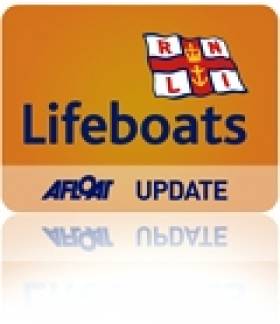Displaying items by tag: helicopter Rescue
Red Bay Lifeboat Crew Provide First Aid to Collapsed Man at Fair Head
Lifeboat crew with Red Bay RNLI put their first aid training into practice this afternoon when a man collapsed while out walking in Boulder Field at Fair Head in County Antrim. The two lifeboat crew had to scale 150 feet of rocky headland to reach the two men who had been out walking and to administer first aid to the casualty.
Red Bay RNLI lifeboat was launched at 3.55pm to the incident and on arrival at the scene the lifeboat crew were able to locate the two men among the rocks. Two lifeboat volunteers left the lifeboat with first aid equipment to give assistance to the casualty. However to reach the men they had to climb 150 feet up the rocky terrain. The Royal Navy helicopter Rescue 177 from Prestwick arrived a short time later with a paramedic and was able to stabilise the casualty and winch both him and the other man aboard and bring them both to Coleraine Hospital.
Commenting on the callout Red Bay RNLI lifeboat helm Paddy McLaughlin said, " Thankfully we are very familiar with this area and two of our lifeboat crew were able to use their first aid training and go to the assistance of the casualty. This is not an easy area to access and the two men had been out walking since breakfast."
Last August Red Bay RNLI lifeboat crew brought a brother and sister to safety when they got into difficulty among the rocks at Fair Head.
Additional report from HM Coastguard
TWO MEN STUCK ON CLIFF AT FAIR HEADAt 3.50 pm this afternoon, Coleraine Police were in touch with Belfast Coastguard earlier this afternoon to inform them about two men stuck on a cliff at Fair Head in Northern Ireland.
Both were wearing high visibility jackets whilst one man is aged 46, the other 52. The first informant, the younger man, suggested that the elder of the two men was in a state of collapse with vertigo and needed urgent attention.
The Ballycastle Coastguard Rescue Team were immediately turned out along with the Red Bay RNLI inshore lifeboat. A rescue helicopter – R177 – from Prestwick was also scrambled.
The position of the two men was given as near Murlough Cottage Caravan Park and that they were halfway up the rocks.
The weather was cold with high and clear skies at the time. When rescue units arrived on scene the two men could be seen wearing warm jackets and spotted halfway between the cliff base at Fair Head and the shore in heather and rocks. They were in a sheltered position.
By 4.30 two RNLI lifeboat crew had come ashore and made contact with the two and was administered first aid to the older man, and by 5.15 both casualties had been taken in to the helicopter, one by stretcher, and were transferred to Coleraine hospital.
The hospital landing site was also manned by the Coleraine Coastguard Team to assist in a quick transferal of the casualties into A&E.
Belfast Coastguard Watch Manager Steve Carson said
"We understand that the two men were out for a walk and became disorientated. Fortunately one of them had a phone on him and was able to get a signal to alert the emergency services.
"Do please check the weather before you set out and make sure you have sufficient supplies if planning an extended trip. For any emergencies on the cliffs, rocks beaches and seas around the Northern Ireland coastline please dial 999 and call the Coastguard."
Related Safety posts
RNLI Lifeboats in Ireland
Safety News
Rescue News from RNLI Lifeboats in Ireland
Coast Guard News from Ireland
Water Safety News from Ireland
Marine Casualty Investigation Board News
Marine Warnings






























































